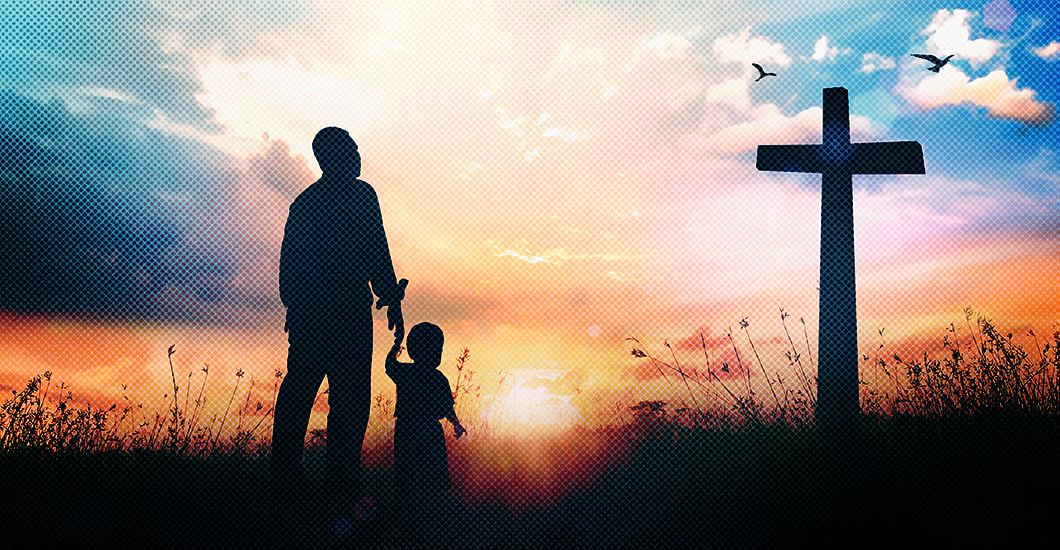Home/Evangelize/Article
Trending Articles
Stronger Than a Brick Wall
Does God really care about what’s happening in your life? This story, fictional or not, is sure to change your perspective. During the Second World War, a soldier got separated from his unit. The fighting had been intense, and in the smoke and crossfire he had lost touch with his comrades. Alone in the jungle, he heard enemy soldiers approaching. In his desperate search for cover, he scrambled up a high ridge and found some small caves. Quickly he crawled inside one of them.
Although safe for the moment, he realized that if they followed him up the ridge and searched the caves, they would find his hiding place. As he waited anxiously, he prayed, “Lord, please spare my life. Whatever happens, I love you and trust you. Amen”. The heavy tread of enemy boots drew closer and closer.
“Well, I guess the Lord isn’t going to help me out of this one”, he thought dejectedly. Morosely, he watched a spider building a web in front of his cave. “Hah”, he fretted, “What I need is a brick wall and the Lord sends me a spider web. God does have a sense of humour”. As they neared his cave, the soldier prepared to make his last stand, but then he heard someone say: “There’s no point looking in this cave…he couldn’t have entered without breaking that web!”
To his utter amazement, after a cursory glance, they moved on. The fragile spider web had saved him after all. “Lord, forgive me” he prayed. “I had forgotten that You can make a spider web stronger than a brick wall.
“God chose what is foolish in the world to confound the wise! God chose what is weak in the world to shame the strong.” (1 Corinthians 1:27)
Shalom Tidings
Related Articles
Latest Articles
Do you know how to battle the storm that obstructs your way? We all want control and we all want freedom. We want to be able to grasp the course of our lives. It is easy to fall into the trap of desiring this control we can never have. We cannot go back and change the past, and we cannot direct the future exactly as we please. It is also too easy to reduce this desire to a lack of trust in God or a lack of concern for His own will, but often, we may desire this control because we think it will help us serve God best. We get sucked into a cycle of worry because we are trying to please God. But do we stop to see what He has to say about such a thing? Tormenting Past As a university student, I find myself too often worrying about doing everything right. I am actively trying to discern God’s will for my life during such a pivotal time (which, of course, is a good thing), but sometimes to the point that I am too worried if I am failing to properly follow His will or if I am seeking to control and direct my life instead of letting God lead. The irony here is clear retrospectively but can be unnoticeable at the moment. I find myself stressing about the past, wishing I could go back and find answers to the problems I both endured and created. The result is a cycle of painful questions–Why did I say that? Why did this person do this? What does it all mean? Did I learn the right lesson? Why did somebody else get something I wanted? I am always trying to find a solution, trying to take back control, trying to figure out what others are doing right that I am not. But sometimes, all we need to do is let go. Recently, I attended a Sisters of Life* retreat where we learned about imaginative prayer, a spiritual exercise where you use your imagination to place yourself in a scene and let God speak to you. At the same time in my life, I was preparing for training as a sailing instructor, another thing that left me worried as I sought to predict how the course would turn out. Would I succeed? If I didn’t, all my summer plans would be ruined, and I would have no job. What would I do then? What if the other trainees passed and I didn’t? The Bible story my imagination immediately turned to was the story of Jesus calming the storm on the ocean while the disciples were in the boat. I placed myself into the scene. Sailing through the Storm I vividly saw in my mind the boat I had always grown up sailing, the harbor where I spent countless hours practicing, and I saw the storm I had been caught in my first days sailing all those years ago. When the wind is powerful enough, it fills the sails and tilts the sailboat to its side. The skipper must lean back over the side to flatten the boat or release the mainsheet (the rope used to control the sails), all while continuing to clutch the tiller (steering instrument) and direct the boat with just one hand. Fighting currents and fighting wind, it takes all your strength and willpower as the waves are splashing over the side and the wind whips your eyes, bringing you to tears. Fighting to hold onto everything and prevent the boat from flipping over can become an impossible task. It was then, in my prayer, that Jesus began to walk across the water toward me. He reached out His hand for me to grasp. If I reached for His hand, I would have to let go of one of the controls I was using to keep my boat moving. I continued to cling to the mainsheet and the tiller, my hands cramping, the wind tearing my eyes and my hair, leaning back so far that my back nearly touched the water in an impossible gymnastic move. He waited for me. I let go of the rope holding the sail and took His hand. It was then that the pressure on the sail from the wind was released. The boat slowed and flattened until it came to a stop and merely bobbed in the waves, sails flapping in the breeze, with no risk of tipping over. Jesus climbed into the boat. Offer it up Like a patient, loving Father and friend, He directed me when I was ready to take up my course again and keep going now that the pressure and anxiety were released. Sometimes, we don’t have to keep trying to find a solution, fighting to hold everything together, sometimes, all we need to do is let go of the past, our problems and give them to God. Then, we'll just need to take up our course and begin again. After having the time for that prayer, I attended Mass, and the homily confirmed the message placed in my heart. The Gospel was about when Peter asks Jesus what is going to happen to John, and Jesus replies: “What concern is it of yours?” The priest emphasized how Peter’s path was very different from John’s. Jesus not only told Peter not to worry about John but also clarified who he should focus on; He said: "You follow Me.” Peter, of course, went on to be the leader of the Church and now has the most famous basilica in Rome named after him. The week following the retreat, I had my sailing training and not only passed but also was offered a job opportunity for future summers. What was I so worried about? That, along with the other problems and mistakes of the past that I was clinging to, just needed to be let go of to find peace. This does not mean avoiding dealing with problems at all; rather, it allows us to take a step back before returning to the situation, and often, a solution reveals itself. Sometimes, it does mean letting go of problems we cannot solve, like questions about the past or the future. Jesus wants to bear our burdens with us. When we place our trust in Him and leave our worries at the foot of the Cross, solutions are inevitable. *Sisters of Life, based in North America, is a Catholic religious community that follows Augustinian rule and promotes pro-life.
By: Sarah Barry
MoreI’m no longer trapped…I found my way. Living with Complex Post-Traumatic Stress Disorder (CPTSD) is an ongoing journey that has greatly shaped my relationship with God and deepened my faith. For many years, I was tormented by nightly nightmares, a relentless reminder of past traumas that seemed inescapable. My sleep was frequently interrupted by vivid and distressing dreams that left me emotionally drained and spiritually desolate. However, a pivotal moment in my life—my Baptism—marked the beginning of a significant transformation. The nightmares ceased, but my journey of healing was far from over. CPTSD, unlike its more widely recognized counterpart PTSD, arises from prolonged exposure to trauma, often during childhood. There is no cure—just the management of symptoms. This condition manifests in various ways—emotional flashbacks, hypervigilance, chronic feelings of emptiness, amnesia, and an impaired sense of self. For me, these symptoms translated into a constant state of anxiety and a pervasive sense of disconnection from the world around me. Yet, amidst these challenges, I came to see how this condition has made me uniquely aware of my own emotions and deeply empathetic and protective towards the struggles of others. Signs & Symptoms When the nightmares stopped after my Baptism, I felt that a heavy burden had been lifted, and I could finally rest. In fact, the very first words I heard God speak over me immediately after my Baptism was: “I will give you rest.” This miracle was a tangible sign of God's grace and a testament to the power of the sacrament. However, while the most debilitating symptom was alleviated, other symptoms persisted, which I believe were opportunities to draw closer to God. The phrase: "I will give you rest" (Matthew 11:28) is commonly interpreted as an invitation to physical rest, a respite from the demands and labors of daily life. In this context, it resonates with those who are weary and burdened, promising them a moment of peace and tranquillity. However, a deeper exploration of this passage reveals that its meaning can be understood more as an invitation to find spiritual rest in God, even amidst the most turbulent times and challenges of life. The imagery of rest as a spiritual state can be likened to the experience of a warrior in battle. In the heat of conflict, a soldier may not find literal rest, but through faith and reliance on God, they can experience a sense of peace and assurance. It means that even when we are engaged in the battles of life, we can find a deep-seated rest in God’s presence that transcends our circumstances. When we consider the life of Jesus, we see that He experienced extreme challenges and turmoil, yet He was able to remain at peace. Mark 4:35-41 recounts the story of Jesus calming the storm. While the disciples were terrified by the raging winds and waves, Jesus slept peacefully in the boat. His calm amid the storm serves as a powerful illustration of what it means to rest in God. When He woke up, He rebuked the wind and the waves, demonstrating His authority over creation and teaching us that true rest is not the absence of storms but the presence of Christ in our lives. Fighting with Hope In times of personal battle—whether it be battling the remnants of trauma, confronting fears, or facing life’s uncertainties—finding rest in God means choosing to lean on Him for strength, guidance, and reassurance. It involves surrendering our anxieties and burdens to Him, trusting that He will provide what we need to endure and overcome. The rest He offers is a deep peace that can coexist with our struggles, allowing us to navigate life's challenges with hope and resilience. Furthermore, the call to rest in God invites us to cultivate a deeper relationship with Him, one that transforms how we engage with our circumstances. When we actively seek His presence in prayer, scripture, and community, we begin to experience the essence of that rest. It becomes a source of strength that carries us through difficult times, empowering us to face our battles with a renewed spirit. The journey towards healing is not a straightforward path, but it is filled with moments of grace and encounters with God’s love. I believe that God has a purpose for allowing my condition to persist; I understand that my weaknesses are a conduit for God’s strength. If I were completely healed, I might be tempted to rely solely on my own strength and drift away from the closeness I now share with God. My struggles are a blessing that keep me grounded in my need for God’s grace, reminding me of His constant presence in my life. In the words of Romans 5:3-5: "We also boast in our sufferings, knowing that suffering produces endurance, and endurance produces character, and character produces hope, and hope does not disappoint us, because God’s love has been poured into our hearts through the Holy Spirit that has been given to us." My journey with CPTSD is a testament to the enduring hope and transformative power of God's love.
By: Fiona McKenna
MoreIt was the year 387, when Monica saw seventeen years of her fervent prayers in tears being answered. She was overwhelmed with joy upon seeing her wayward son Augustine getting baptized by Saint Ambrose in Milan. Soon, they left for Africa, where she fell ill due to the land journey. While in Ostia, Monica announced that she did not want to sail back to North Africa and instead preferred to remain in Ostia until her death. Her sons were surprised to learn their mother’s decision because they were hoping to take her back to her homeland. She told them she wanted them to remember her at the Lord’s altar, wherever they were. Through this statement, Monica made it clear that remembering her at the Mass was way more important than her burial location. When Monica knew she was nearing her death, she revealed to Augustine: “Son, nothing in this world now affords me delight. I do not know what there is now left for me to do or why I am still here, all my hopes in this world being now fulfilled.” A few days later, she fell seriously ill, and her soul breathed the last. Respecting her wishes, Monica was buried in Ostia but soon her body was moved to a hidden crypt in Santa Aurea in the 6th century. Later, Saint Monica’s tomb was transferred to the Basilica of Sant'Agostino in Rome. Monica, the patron Saint of Mothers, truly believed that she would be close to her sons during the celebration of the Holy Eucharist. Her unwavering faith in Christ is a profound example that shows prayer without ceasing and hope without doubting shall bear fruit one day.
By: Shalom Tidings
MoreDo you know how to handle little things that drive you nuts? The other day, I misplaced my car keys when I was in my office building, which is a huge place. It has a large first floor with many side rooms, an enormous basement, and various offices upstairs. There were so many places my keys could have been since I went up and down the stairs all day long. Saying a quick prayer, I retraced my steps, trying to remember where I laid my keys down. After walking around for a while, I suddenly remembered where I might have put them and ran upstairs to one of the offices. Sure enough, there were my car keys. Thank you, Jesus! I find that there is always a lesson lurking in the day's events—if I stop and reflect. Just as parents are alert for and use ‘teaching moments’ to educate their kids, so, too, does God use teaching moments to form us. They are often small grievances, for example, driving all the way to the store and realizing you forgot your wallet. Or worse, getting to the checkout with your cart full of groceries before you realize you don’t have your wallet. Or locking your keys in your car—and worse, seeing that you also locked your cell phone in there! Seeking Fervently… These small events can cause frustration and anger, or we can choose to see them in the light of God's training and disciplining us. If we choose the second option, we can say: “Okay, Lord. I choose to praise You and thank You because Ephesians 5:20 says: ’Giving thanks to God the Father at all times and for everything in the name of our Lord Jesus Christ.’” When we lose our keys and are searching for them, we can say: “Thank You, Lord, for this trial of inconvenience.” As fervently as I am seeking for my keys, I want to fervently be seeking You. “Your face, Lord, do I seek.” (Psalm 27:8) If we can perceive God's loving hand in allowing these things to happen so that they can help train and discipline us, then we can smile and even laugh at daily annoyances. This is something that a priest taught me. Father Jack used to call his guardian angel ‘Laughing Boy’ because of these kinds of little mishaps. If he locked himself out of the car, missed a ride, or couldn't find a paper he needed, Father Jack would say: “Laughing Boy is at it again!” And he would chuckle. Father Jack had learned and taught us an important lesson–don’t take yourself too seriously. The ability to laugh at yourself and at the little grievances of the day helps to keep a smile on your face, and then you will radiate joy to those you meet. Remember, there is always a lesson. Take time to ponder and say: “Okay, God. Here I am. What are You trying to teach me in the events of this day?” Then look at how you responded. Did you learn something and grow in virtue, or did you react badly? Don't worry if you fail. There will be more pop quizzes tomorrow.
By: Ellen Hogarty
More







